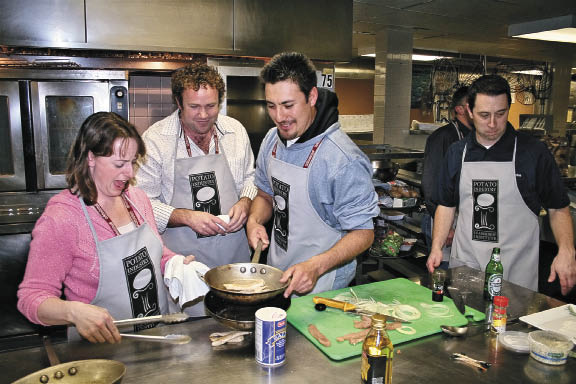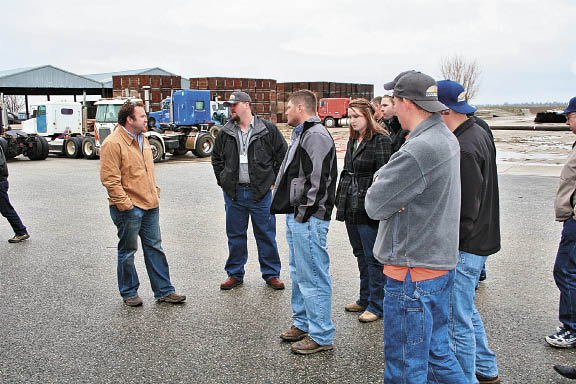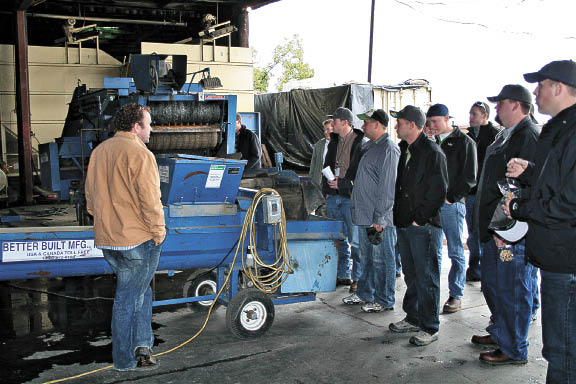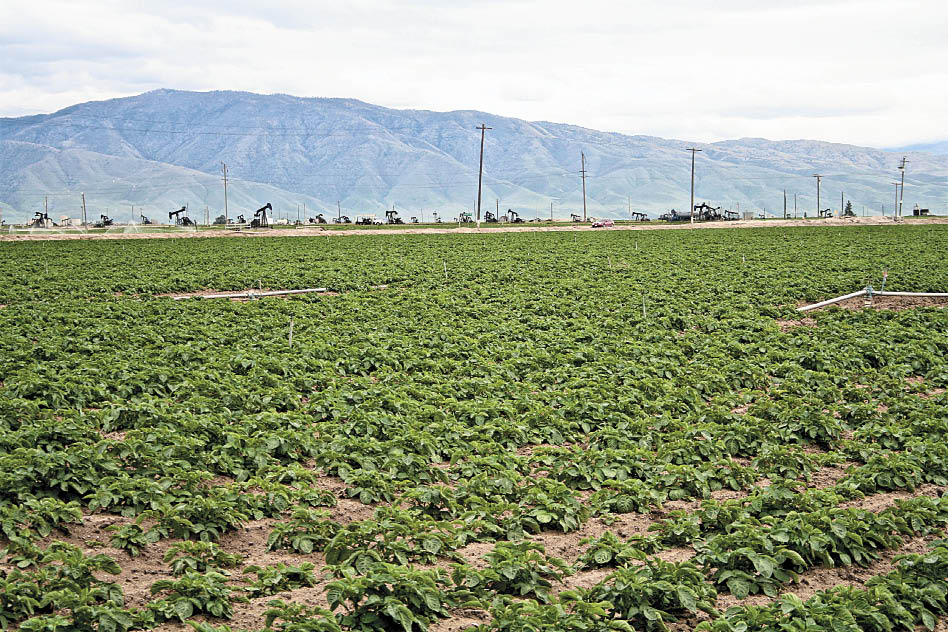
What does the United States Potato Board (USPB) provide to the national potato industry? What motivates growers to leave their farms and livelihoods for days or weeks at a time, traveling across the country to meet with growers and industry associates from other states and regions?
"In terms of my membership on the USPB, I'm out for the greater good of the potato industry," Brian Kirschenmann explains. "Our industry faces continual challenges and barriers, and all of us have a lot to learn. For me, the USPB helps create a network of friends and fellow growers with the same kinds of experience I have."
Kirschenmann is a fifth-generation California potato grower from a family with over 100 years of history in Bakersfield, Calif. He is the owner/operator of Kirschenmann Farms, Inc., where mostly chipping potato varieties are grown. Wheat and carrots are grown in rotation.
Ludwig Kirschenmann, Brian's great-great-grandfather, was the first Kirschenmann potato grower in California. It's speculated he may have even started one of the first potato farms in the state. Brian's grandfather Arnold Kirschenmann, was part of one of the first farms specializing in chip-stock potato production in California, called Edison Kennebecs. He ended up passing at a young age in 1963, leaving Brian's then-16-year-old father Chuck and his uncle Arnold to continue the farming and marketing of what became Kirschenmann Farms and King Pak Potato Company.
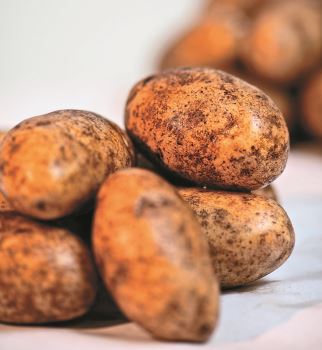
Growing up on the family farm, Kirschenmann expressed little interest or desire to make growing potatoes his future. In the late 1990s, he was living and working in Washington, D.C., having a "dotcom adventure." Then in 2001, his uncle Arnold passed away, and his father, having lost his brother and partner, decided to shed some of his business holdings, eventually selling King Pak Potato.
Later, when Chuck also made it known he was considering selling the farm, Kirschenmann changed his mind and decided he was interested in taking over. By 2004, he was back home again. Today, he is living the dream with his wife, Katherine, and their son, Charles Thomas (age 5), and newborn twin daughters, Annabelle Rose and Clara Ellen.
Chuck is retired from the farm, but as Kirschenmann's father, he continues on as his mentor and challenges his son as the staunchest of devil's advocates.
"He's good to have in important meetings, because he asks the hard questions, and lays out the truth you'd rather not hear or think about," Kirschenmann explains. "He has the experience, and is of the age and attitude of just speaking his mind without a care for how you might accept, reject or think about it. When I want the truth in tough negotiations, he provides it."
In the days of King Pak Potato, Kirschenmann Farms grew fresh table-stock varieties like other Kern County producers to fill the May-June market window, when old fall-crop supplies were diminished and the new-fall crop was still in its growth and production.
"Market transitions drive uncertainty," Kirschenmann explains. "The transition from old to new crop can be the toughest period.
"In the past, Bakersfield excelled in filling this window in the table-stock market because of disease, lack of varieties and the fact growers didn't have sprout-nip to extend their storage season in the fall production states. During the 1940s, Bakersfield had 60,000 acres in potatoes that were packed in over 50 sheds."
With the advent of new potato varieties, disease management tools and CIPC, the demand for California table-stock potatoes decreased over the following decades. Total Bakersfield potato acreage for this year, 2013, was about 12,000 acres. An April 29 article in The Packer reported 2013 russet plantings in Kern County are down 65-75 percent, and the trend is toward smaller and specialty potatoes in the state.
With the sale of King Pak Potato, Kirschenmann Farms focuses almost exclusively on its chip-stock potato production. Most of the production is processed at Frito-Lay's Kern County plant. The farm also supplies chipping potatoes to all the West Coast chip-processing facilities. This is because chipping potatoes cannot go year round in the fall production states because of their thin skins and warm storage conditions. Kirschenmann Farms also supplies In-N-Out Burger for their fresh, hand-cut fries. In-N-Out Burger is a regional fast-food restaurant chain in California, Arizona, Nevada, Texas and Utah.
Kirschenmann Farms has been a Frito-Lay supplier since 1974. In 2009, Brian was selected as the California farmer highlighted by Frito-Lay's "Lay's Local" marketing campaign. This campaign also featured farmers growing potatoes used in Lay's Potato Chips from Florida, Maine, Michigan and Texas.
Kirschenmann and his fellow Lay's growers played a central role as the faces for the iconic potato chips brand in a series of 30-second national and regional television spots. The national campaign launched May 18, 2009, by these growers who joined the Lay's brand team to kick off the initiative by ringing the opening bell at the New York Stock Exchange. The campaign was also the focus of a comprehensive marketing effort celebrating the local connections of the Lay's brand through national print advertising, on-package messaging and 40,000 customized in-store displays.
Kirschenmann is still sought after for publicity spots and featured in interviews and programs. As a grower, he presents a friendly, credible, genuine voice connecting the public to farming and the special attention growing potatoes requires. This is particularly helpful in shaping the potato industry's future in a time when consumers take an increased interest and awareness of their food and its origins. Kirschenmann is adept at answering questions ranging from planting potatoes, to explaining how chipping potatoes require low sugar content to prevent frying too dark.
Growing potatoes in California's Kern County is unique and challenging because of its diverse economy and resources. It is the most productive oil-producing county, and the fourth most-productive county for agriculture, in terms of value, in the United States. Kirschenmann explains how energy development preceded farming and agriculture in the state.
"We have a love/hate relationship with the oil companies," he good-naturedly relates. "We like having plenty of fuel to run our farm equipment, but we hate having to give up land for oil wells. California agriculture in this area really didn't exist until after 1916, when the aqueduct projects were completed to support irrigation. By this time, the oil companies had already bought up all of the mineral rights."
Today, oil wells are interspersed on fields around Kern County. By law, growers must allow access over and through their fields for the oil companies to maintain and service these wells. There are roads and other easements in and out of the fields for this purpose. It can be difficult for growers farming around these oil wells in fields that would otherwise be fairly uniform.
Kirschenmann makes his involvement part of shaping the potato industry of the future. He has been an active participant on the USPB Chip Committee since 2008. He was a member of the 2009 Potato Industry Leadership Institute (PILI) class touring Washington and Oregon. A few years later, Kirschenmann even hosted the 2011 PILI class on tours of his farm and tours through the Kern County Frito-Lay plant and Bolthouse Farms carrot processing facility.
PILI is an 8-day "immersion-like" program providing an overview of the potato industry's challenges and issues beyond the production sector, and the roles of the industry's state and national organizations in maintaining a positive business climate for potato growers. PILI is a joint venture of the National Potato Council (NPC) and the USPB and is sponsored by Syngenta.
Kirschenmann became a USPB board member in 2010, and he was recently elected to serve as Chairman of the USPB Finance Committee at the USPB's 40th Annual Meeting. "I know many growers who would rather complain about how bad things are instead of getting involved and being part of fixing problems and issues," Kirschenmann said. "Being involved takes hard work and effort, but it certainly beats complaining and not accomplishing anything.
"Ultimately, the potato industry is all about creating a better product. We're always going to have challenges like food safety and sustainability. There's a lot of pressure on growers today. Population is increasing and there is more pressure on farm ground, and unfortunately, we can't create more land. We need our networks, our associations of growers working together for the common good."
